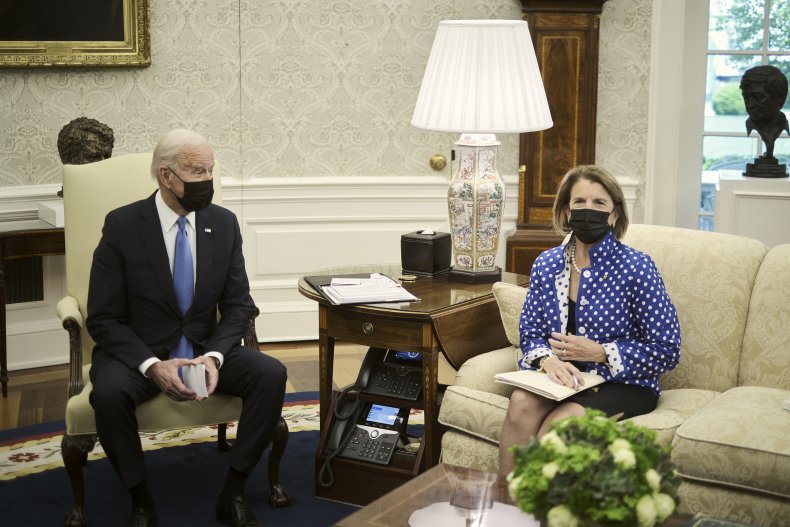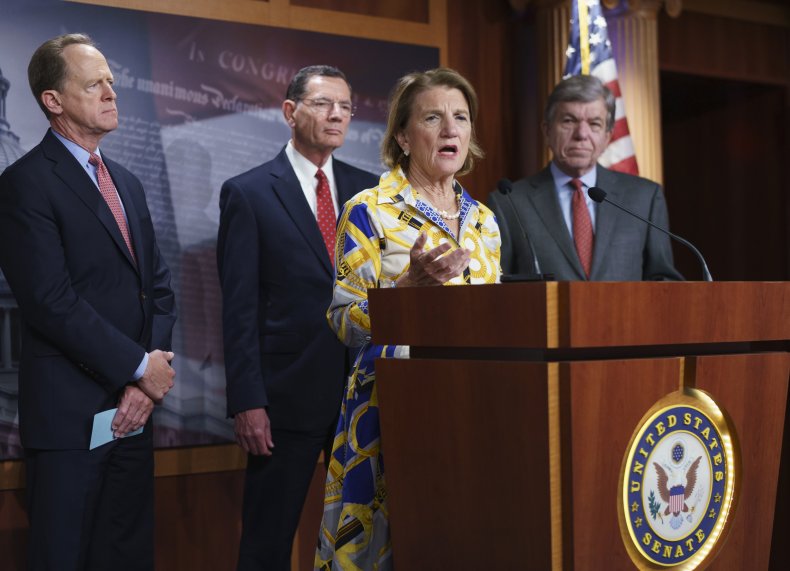Democrats Offer $547B for Infrastructure Ahead of Biden Meeting GOP Sen. Shelley Moore Capito
House Democrats on Friday released legislation that would put $547 billion toward infrastructure ahead of President Joe Biden's meeting with Republican Senator Shelley Moore Capito.
The proposal for the funds for U.S. roads, rail programs and public transit comes from the Democratic chairman of the House Transportation and Infrastructure Committee, Representative Peter DeFazio. Biden has been engaged in rounds of conversations with Capito over infrastructure as Democrats and Republicans debate how to pay for projects.
DeFazio said his legislation is a "once-in-a-generation opportunity to move our transportation planning out of the 1950s and toward our clean energy future."
Separate legislation recently introduced by Republicans would provide $400 billion over five years for infrastructure projects. Republicans are not expected to widely support DeFazio's proposal.
For more reporting from the Associated Press, see below.

DeFazio's proposal comes during a key moment of the infrastructure debate as the White House signals its desire to start wrapping up negotiations.
In his meeting earlier this week with Capito, Biden offered tax concessions aimed at reaching a bipartisan compromise on his overall infrastructure proposal. The two sides are at odds over how to pay for infrastructure projects, with Republicans ruling out higher corporate taxes and the White House rejecting a GOP proposal to use unspent COVID-19 relief funds.
Biden proposed a 15% minimum tax on corporations—there's no minimum tax now on corporate profits—and the possibility of additional revenues from increased IRS enforcement.
He is seeking roughly $1 trillion in new infrastructure spending, down from an initial pitch of $2.3 trillion. Senate Republicans have countered with only $257 billion in additional spending on infrastructure as part of a $928 billion package.
DeFazio's legislation, a reauthorization of surface transportation programs set to expire Sept. 30, doesn't address how to pay for the projects. He tacked on major investments in passenger and freight rail, key pieces of Biden's $1.7 trillion American Jobs Plan within his committee's jurisdiction.
The bill is being closely watched as a building block toward a broader infrastructure package. DeFazio's panel is expected to debate and vote on the measure next week.
A similar dynamic is playing out in the Senate, where a panel recently passed its version of the highway bill unanimously, but the lawmakers didn't have to vote yet on how they would pay for it.
DeFazio's legislation used as a starting point a bill that passed his committee last year without GOP support and was then rolled into a $1.5 trillion infrastructure package that passed the House but went nowhere in the Senate.
The bill would boost investment in roads and bridges by about 54% with an emphasis on fixing existing infrastructure. It would dedicate about $4 billion to electric vehicle charging stations and would provide record levels of investment for pedestrian and cyclist pathways. It would also seek to reconnect low-income communities divided by highways with a $3 billion program "to correct mistakes of the past."
Business groups such as the U.S. Chamber of Commerce and the Business Roundtable have called on lawmakers to continue negotiations and work toward a bipartisan compromise.
But some Democrats have questioned the merits of that approach and are already unhappy with some of the compromises that Biden has offered. They support using a process that would allow Democrats to pass an infrastructure boost with a simple majority, which they did through a COVID-19 relief measure that delivered $1,400 payments to most Americans.
"Getting Republicans on board is not necessary. Getting the American people back on their feet is," Representative Jamaal Bowman (D-N.Y.) said Thursday night.


